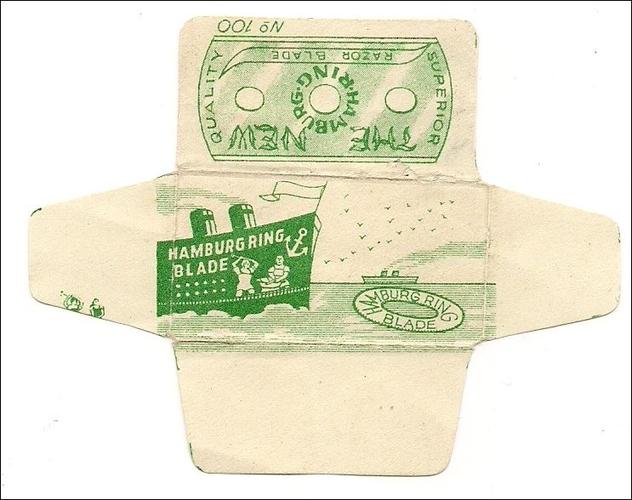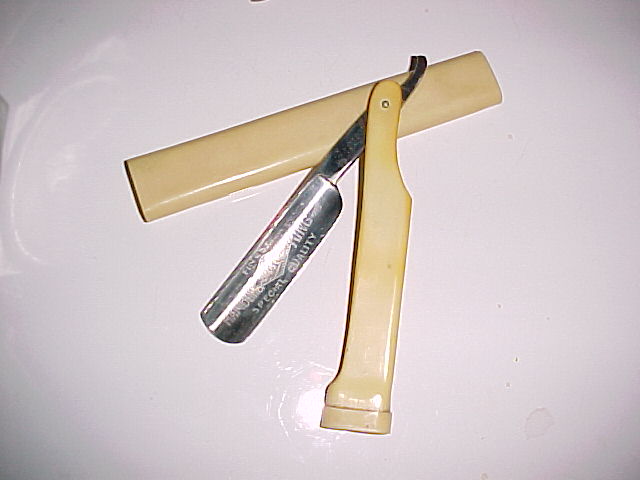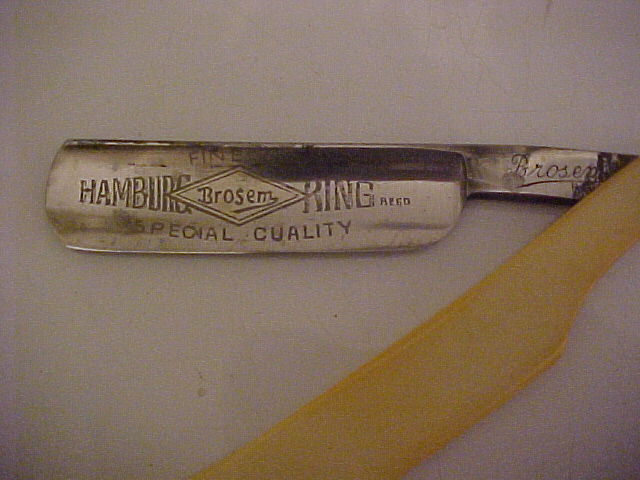Results 1 to 10 of 25
Thread: Hamburg Ring?
Hybrid View
-
06-14-2013, 02:03 PM #1Senior Member



- Join Date
- Apr 2008
- Location
- Essex, UK
- Posts
- 3,816
Thanked: 3164
There are people who maintain that they know the answer, and others who say that it is open to conjecture. In the absence of anything from the 'horses mouth' or in black and white or patent law, I suppose it can only be conjecture...
I have read somewhere that the 'hamburg grind' refers to the type of hollow with the stiffening belly just before the second hollowing immediately above the bevel - perhaps that got confused with 'hamburg ring' at some point. The first extreme hollow grinding originated in Germany "the witch" (or 'Hexe' in german, built by C F Ern in 1893) and used a double-wheeled grinding machine. At that time a lot of english blades and steel were sent there to be ground as they had the leading edge technology, so 'Ground in Germany' (or Hamburg) acquired a certain cachet.
Full hollow ground blades make quite a bit of noise in use, and extra hollow ground blades were said to ring or 'sing' - hence the equivalent 'singing blade' for an extra hollow ground razor. Why Hamburg became synonymous with the words 'grind' and 'ring' rather than Solingen - which is about 250 miles away - is a bit obscure, but could be explained by the fact that in the 19th century it was europes third largest port and was already famed and powerful - it was one of the last three cities left in the mighty Hanseatic League before its final collapse in 1862 and at the beginning of the 20th century it became a gateway for travel to america and home of the worlds largest transatlantic shipping company. It was Germany's most important industrial centre, and as such was very heavily bombed in WW2. But - although there were certainly a lot of razor makers in Hamburg, there were more in Solingen and its environs.
Some refer to a 'ring of cities' around Hamburg, which seems a bit like clutching at straws to me and merely an attempt to justify the name by some sort of back derivation, especially when we consider that C. F. Ern set up in Solingen Wald some 20 years before introducing the double-grinding machine - in Solingen, not Hamburg.
The technology didn't stay in Germany though - a lot of razors were ground in Sheffield and even english ones that were ground in Germany at some point in their history ended up being ground in Sheffield as Sheffield gained supremacy over Solingen.
This gave rise to a few anomalies, like blades with 'Ground in Sheffield' on the tang and "Hamburg Ring' on the blade. Attempts were made to cash-in on the popular term, such as "The Sheffield Ring," "The True Ring," "The Silver Ring," and others. The razor with "The True Ring" on it spells it out for me. It links in the musical sound of the 'singing' razor with the symbol/metaphor/expression of a 'bell ringing true' which means that it has the quality of correctness. In old days most people could not afford timepieces, and a bell was rung by a clocktower on the hour as a 'master reference.' Perhaps Hamburg was the master reference in this respect of blade forging.
However, all this is just fancy. The most we can draw from the scant facts we have is that 'Hamburg Ring' does not refer to a ring of cities.
Incidentally, don't think that this argument applies only to straight razors:

On the liner there is a picture of a two-man team forging steel on an anvil. Typical steel anvils ring like a bell. So much so that Richard Wagner used 18 of them in the Das Rheingold scene from Der Ring des Nibelungen - all tuned in octaves! Imagine the sound of a city full of steel forgers and blacksmiths - the ringing must have been intolerable! Perhaps another clue to the meaning..... perhaps not.
Regards,
Neil
-
The Following 5 Users Say Thank You to Neil Miller For This Useful Post:
Crawler (08-12-2018), gromowski45 (02-26-2016), JimmyHAD (06-14-2013), silverloaf (03-22-2014), Stozzberry (06-14-2013)
-
06-14-2013, 02:39 PM #2Ex-lurker

- Join Date
- May 2013
- Location
- New Delhi (India) / Europe
- Posts
- 48
Thanked: 3
Just stumbled across this thread and will sow a bit more confusion: the noun 'Ring' in German has a number of meanings; the first one is simply a circle shape, in that sense it's used for instance when talking about a wedding band but also the ringroad around a city. Then it's used to designate a boxing ring and thirdly, although this is nowadays archaic but was very much used 40 and more years ago, 'Ring' also means an association of people sharing a common goal or interest, 'club' in English. In the '20s and the interbellum there existed in Germany a wide range of all kinds of such clubs, associations.... A full explanation would take too long but when 'Ring' was used in that sense it mostly designated an association or club involved in physical activity (boxing, cyclism...). In everyday use the term 'Ring' when talking about a cub carried a certain connotation as being more applicable to blue collar workers and even going as far as approaching the english 'gang'. It's hard to accurately explain as to my knowledge there's no english equivalent that captures the entire meaning.
Anyway, I doubt that this helps a lot but one never knows.It is preferable to have a criminal as a servant rather than a fool because a criminal's actions are at least predictable.
-
06-14-2013, 02:55 PM #3Senior Member



- Join Date
- Apr 2008
- Location
- Essex, UK
- Posts
- 3,816
Thanked: 3164
That is very interesting, Xenophon, and it may well be a contributing factor.
Also, if I'm not mistaken, blades in german is 'klingen' and 'klingend' also means 'ringing' so we might have the ringing quality of a thinly ground blade right there, too.
Regards,
Neil
-
06-14-2013, 03:00 PM #4Ex-lurker

- Join Date
- May 2013
- Location
- New Delhi (India) / Europe
- Posts
- 48
Thanked: 3
Correct and if I'm not mistaken Dovo produces/produced a straight that was extra hollow ground and inscribed with 'Prima Klang', or 'excellent sound' (=the sound of the whiskers popping under the blade). Anyway, if someone ever needs a (razor-related!!) translation, from German, just let me know, happy to help.
It is preferable to have a criminal as a servant rather than a fool because a criminal's actions are at least predictable.
-
The Following User Says Thank You to xenophon For This Useful Post:
Stozzberry (06-14-2013)
-
06-14-2013, 07:29 PM #5Senior Member

- Join Date
- Jan 2013
- Location
- Southeastern IL
- Posts
- 107
Thanked: 4
Well, since some of you all are showing pictures of your Hamburg Ring, here's mine:
![Name: IMG_0540[1].jpg
Views: 824
Size: 32.4 KB](https://sharprazorpalace.com/attachments/razors/132924d1371238114-hamburg-ring-img_0540-1-.jpg)
![Name: IMG_0542[1].jpg
Views: 773
Size: 27.4 KB](https://sharprazorpalace.com/attachments/razors/132925d1371238141-hamburg-ring-img_0542-1-.jpg)
![Name: IMG_0545[1].jpg
Views: 757
Size: 18.4 KB](https://sharprazorpalace.com/attachments/razors/132926d1371238160-hamburg-ring-img_0545-1-.jpg)
-
06-14-2013, 07:40 PM #6
-
06-15-2013, 02:21 AM #7Senior Member

- Join Date
- Jan 2013
- Location
- Southeastern IL
- Posts
- 107
Thanked: 4
Unusual...I like it!


 14Likes
14Likes LinkBack URL
LinkBack URL About LinkBacks
About LinkBacks






 Reply With Quote
Reply With Quote


